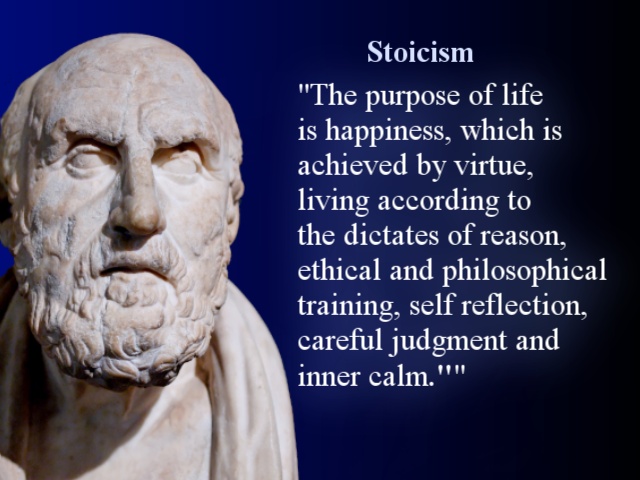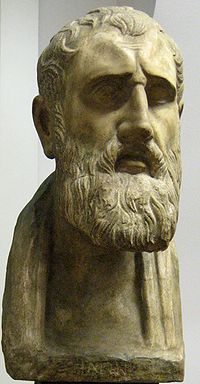Mainly based on info from “A Guide to the Good Life: The Ancient Art of Stoic Joy” – William B. Irvine
The First Stoics
- Zeno – (333-261 BC) = the first Stoic
- started as a Cynic
- “same” as today’s homeless
- Antisthenes
- pay attention to your enemies, for they are the first to discover your mistakes
- the Cynics were renowned for their wit and wisdom
- Diogenes (pupil of Antithenes) – the most famous Cynic
- Bad man obey their lusts as servants obey their masters.
- because they cannot control their desires, they can never find contentment
- lived on the streets of Athens.. same as Sokrates
- constantly pushing their philosophy on other people
- found to be more interested in theory than the cynics.. hence .. a combination & lifestyle & theory
- as Socrates had done
- Zeno’s school of philosophy enjoyed immediate success
- his followers became known as Zenonians first… but.. because he gave lectures in Stoa Poikile.. it turned into…. STOICS
- one reason for it’s success.. The Stoics favored a lifestyle that, although simple, allowed creatures comforts
- Zeno’s philosophy had ethical, physical, and logical components
- Stoics believe that man’s distingushing feature is his rationality
- Ethics was the most important component of Zeno’s Stoicism
- not “modern” ethics.. rather eudaemonistic ethics
- it is concerned with having a “good spirit”
- living a good, happy life
- moral wisdom
- …to flourish
- ..we differ from other animals in one important respect: We have the ability to reason…. in other words.. we were designed to be reasonable.
- designed to do certain things, that we have certain duties
- most significantly.. we have duties to our fellow men
- we should honor our parents
- be agreeable to our friends
- and be concerned with the interests of our countrymen
- If we lived in perfect accordance with nature – if, that is, we were perfect in our practice of Stoicism – we would be what the Stoics refer to as a wise man or sage
- a stoic sage is, in short, “godlike”
- such “godlikeness” is exceedingly rare
- they talk about sages primarly so they will have a model to guide them to aim at…
- the sage, in other words, is to Stoicism as Buddha is to Buddhism
- Most buddhists can never hope to become as enlightened as Buddha, but nevertheless, reflecting on Buddha’s perfection can help them gain a degree og enlightenment
- a stoic sage is, in short, “godlike”
- Cleanthes(331-232 BC) – pupil of Zeno
- became the leader when Zeno died
- when he got old.. started losing students to other schools
- Chrysippus(c. 282-206 BC) – pupil of Cleanthes
- became leader after Cleanthes
- the school regained it’s former prominence
- Panaetius of Rhodes
- known as an “exporter” of the philosophy
- took Soicism with him to Rome in 140 BC
- founder of Roman Stoicism
- the Roman’s showed less interest in logic & physics.. by the time Marcus Aurelius, the last great Roman Stoic, logic and physics had essentially benn abandoned
- Roman Stoics main goal – attaining of tranquility
- Stoic tranquility was a psychological state marked by the absence of negative emotions, such as grief, anger, and anxiety, and the presence of positive emotions, such as joy.
- The Roman Stoics had less confidence than the Greeks in the power of pure reason to motivate people
- By highlighting tranquility in their philosophy, the stoics not only made it more attractive toancient Romans but made it, I think, more attractive to modern individuals as well
Roman Stoicism
- 4 Most important:
- Seneca, Musonius Rufus, Epictetus & Marcus Aurelius
- Seneca– the best writer
- essays & letters to Lucilius
- Musonius
- pragmatism
- detailed advice on eating, what to wear, how to behave, etc…Sexlife
- Epictetus
- analythics
- why practicing Stoicism can bring us tranquility
- Marcus Aurelius
- “Marcus’s Meditations” (kind of a diary) – access to the thought’s of a practicing Stoic
- Seneca (born between 4 & 1 BC)
- from Spain
- much available writings
- his writings are quite wonderful
- his essays & letters are full of insight into the human condition
- typically talks about the things that make people unhappy
- grief, anger, old age, social anxiety,…
- successful playwright, very rich (invester).. and Senator
- principal advisor to Emperor Nero
- banishment – Corsica, confiscation of all property by Emperor Claudius
- Returned after 8 years – Nero’s teacher… and Nero’s advisor when Nero became Emperor
- .. in 65 Nero ordered Seneca’a dead
- Gaius Musonius Rufus (born ca 30AD)
- the least well-known of the 4 great Roman Stoics
- started a school of philosophy
- did not write down much (as Socrates)
- pupil called Lucius took notes
- enemy of Nero
- Nero had him banished
- in 65AD he was sent to the island of Gyara – according to Seneca .. one of the worst places to be exiled
- returned to Rome after Nero’s death
- again banished
- Died ca 100AD
- “We should study philosophy.. how otherwise could we hope to live well ?”
- Epictetus (born into slavery ca 55AD)
- pupil of Musomius & “white collar” slave
- gained freedom after Nero’s death
- Philosphy school in Nicopolis -popular
- primary concern of any philosophy should be the art of living
- much mention of religion / God / Zeus.. but he probably means “Nature”
- If we should have a good life.. we must consider our nature and the purpose for which God created us and live accordingly… live in accordance with nature (ZENO)
- Marcus Aurelius (born in 121)
- “Begin each day by telling yourself: Today I shall be meeting with interference, ingatitude, insolence, disloyalty, ill-will, and selfishness – all of them due to the offenders’ ignorance of what is good or evil”
- the most powerful man in the world – Emperor of Rome
- in “Meditations” he reflects on life and his response to it
- far more interested in Stoic ethics (philosophy og life), than physics & logic
- Hadrian adopted Antoninus (Marcus’s uncle).. and when Antoninus becam emperor.. Marcus was a virtual co-emperor
- when he got power, he appointed Lucius Verus as joint emperor
- as Emperors go, Marcus was exceptionally good
- “the last of the Five good Emperors” (Nerva, Trajan, Hadrian , Antoninus… and Marcus)
- 96 – 180
- the period in history of the world during which the condition of the human race was most happy & prosperous
- Marcus didn’t feel compelled to prove that tranquility was worth pursuing, he thought its value was obvious
- did not lecture his fellow Romans on the benefits of practicing Stoicism
- ulcer, unfaithful wife, born at least 14 kids.. only 6 survived, many wars, rebellion, etc…. IN GREAT NEED OF STOICISM
- sick and died in 180 – 17 March
- “The art of living is more like wrestling than dancing”

